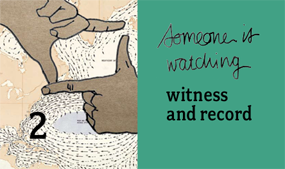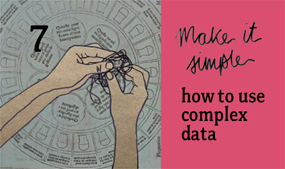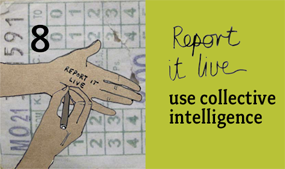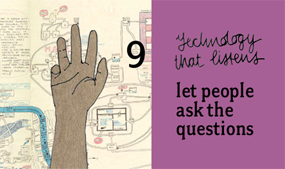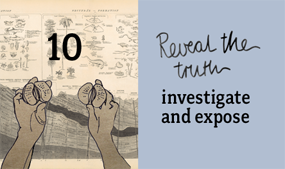
download this basic card (pdf 180kb)
THIS CARD PRESENTS THE BASICS ABOUT YOUR RIGHT TO ACCESS INFORMATION AND HOW TO USE THIS RIGHT AS PART OF YOUR ADVOCACY STRATEGY. IT EXPLAINS HOW TO ACCESS GOVERNMENT-HELD INFORMATION AND MAKE INFORMATION REQUESTS AND HOW TO RESPOND IF YOUR REQUEST FOR INFORMATION IS DENIED.
YOUR RIGHT TO ACCESS PUBLIC INFORMATION
Public bodies operate with public money. Their role is to serve members of the public and the information they create and hold belongs to the public. National and international law recognises that members of the public have a fundamental right of access to information from public bodies.
Even if your country doesn’t have an ‘access to information’ law (called ‘freedom of information’ or ‘right to information’ in some countries), there are likely to be some provisions which require public officials to answer requests from the public. Here is a link to a full list of the countries with ‘access to information'.
|
The right of access to information operates in two ways:
Proactive: public bodies are under an obligation to provide, publish and disseminate information about their main activities, budgets and policies.
Reactive: all people have the right to ask public officials and bodies for information about what they are doing and what documents they hold.
|
Activity 1: DECIDE WHAT YOU WANT TO KNOW
Before you request information, decide what you need to know to achieve your goals.
Write down one of your advocacy goals and identify which pieces of information are likely to have the most impact in achieving it.
For example, if your goal is to increase government spending on pre-natal care for pregnant women in public hospitals, then perhaps you need accurate information on real current spending in this area. Is that information alone sufficient and meaningful? Would it have more impact if you also had some comparative information? You could compare how much is spent on treating the health problems suffered by mothers and children who don’t have good pre-natal care. Or you could compare the amount spent on pre-natal care each day with the amount spent on the military. Your knowledge of your government’s spending will help you find a comparison that strengthens your argument.
Identify the sources for this information
A number of information sources, private and public, may cover the issue that you are working on. In our example, some of the information about how much money is available for pre-natal care might be available from doctors and hospital directors, but budget allocations and spending reports will be held by health and finance ministries or the state audit office. Try and think of two or more information sources in order to cross-reference the data that you get and to verify its accuracy.
FIND GOVERNMENT INFORMATION
Before you file a request for information, check whether the information is already published. Carrying out such a search can save time.
Activity 2: TRY TO FIND INFORMATION THAT IS ALREADY PUBLISHED
Search for information relating to your cause that is already published by the government:
- Through the websites of public bodies: for finance information, try the ministry of finance site or that of the national audit body. If the information concerns a public service, such as education, health or employment, try the websites of those ministries.
- Through a search engine, such as Yahoo, Google, or a search engine popular in your region. Try searching in languages other than your national language. Useful information might be found in English in reports submitted to donor countries, or in reports written by international NGOs or think tanks.
- Through local, state or national libraries or government information offices. Visit in person, or phone to speak to a librarian or administrator, but beware of spokespeople who may put a ‘spin’ on information.
- By visiting a public body’s office in person. Central government ministries are not always very open to the public but it’s usually possible to walk into an authority’s building to ask for information.
If trying to find information yourself proves time-consuming or frustrating, then use your right of access to file a request for information.
MAKE AN ACCESS TO INFORMATION REQUEST
Remember that you have the right to ask the government questions and the government has a responsibility to respond. There are limited exceptions (explained below) which mean that they may not always give you the information you request, but they must respond to your request.
- Who can make a request?
Under almost all countries’ laws, anybody can make a request for information regardless of their nationality. There is no need to justify your interest or explain what you will do with the information. You will usually need to give your name and either a postal address or email address in order to receive the information.
- How do I make my request?
Generally in writing, by post or e-mail, submitted to the public body in question. Some countries allow oral requests, although it’s a good idea to keep a record of what you have asked and when.
- What should I say in my request?
Your request should be as specific as possible, to help the public officials identify the information and give them fewer reasons to reject it. In most cases it is not necessary to identify the particular document required. Keep your questions simple. You have a better chance of getting a quick answer and you can always make follow-up requests. You don’t have to mention the ‘access to information’ law, but doing so can be useful as it shows you know your legal rights.
Activity 3: PREPARE YOUR REQUEST
Writing a request is simple and straightforward. Use language appropriate to professional communication in your country.
|
Dear Sir/Madam
I am writing to request the following information under the Freedom of Information Act (2000):
- The total amount of money spent during 2006, 2007 and 2008 on vaccinations for children under the age of 8 years. I would like this information broken down by year and if possible by month.
- The total number of children vaccinated in 2006, 2007 and 2008 under the government’s new ‘Vaccines for All’ programme.
I would prefer to have this information sent electronically to my e-mail address which is given below.
If you have any questions or need to clarify this request, please do not hesitate to contact me.
Yours faithfully, ....
|
- How will I receive the information?
You can access the information in different formats: inspection of originals, photocopies, DVDs, CDs etc. In almost all cases, unless it is not reasonable or very expensive, you have a right to receive the information in your specified format.
- When will I receive the information?
This is specified by law, and varies by country: very few countries take more than one month. The average is around 15 working days.
Most countries permit public bodies to extend the time taken to provide information by a few days or up to an extra month if the request is complex. In all cases the person making the request should be notified of the delay and clear reasons given.
- Will I have to pay for the information?
Filing your request for information should always be free of charge (in a few countries this is not the case and there is a small fee). You may have to pay for photocopies and postage. These charges should be according to published rates. If you suspect you are being charged too much, raise your concerns with the public body and/or with the ombudsman or information commissioner.
CAN I ACCESS ALL GOVERNMENT INFORMATION?
No. The right of access to information is not absolute. Information can be withheld on grounds such as national security and public order, protecting criminal investigations, privacy or preserving the commercial interests of private companies. You will find a full list of exceptions and guidance in your national 'access to information' law.
Governments should only withhold a small amount of information and they must prove that it needs to be kept secret. Public bodies are also obliged to balance the secrecy rule against the public's interests. If disclosure is very much in the public interest, information should be disclosed even where an exception applies.
Be aware that exceptions apply to information and not to entire documents. When an exception applies, public bodies should give you partial access to documents; this is done by blacking out or removing sensitive details and giving you the rest of the document. If this happens, the public body should tell you that they have 'edited' the document, and mark the omissions, justifying in detail why they were necessary.
Activity 4: ANTICIPATE THE EXCEPTIONS
Consider if any of the information you are seeking may fall under an exception. Could the public body restrict access to the information on political grounds? if so, try to distinguish information that common sense says should not be excepted, then file separate requests. Before you file a request, plan how you will react if you don't get the information, especially if you suspect that you may meet resistance.
Strategies you can use:
- Announce in advance that you are filing the request - this strategy puts the government under pressure to answer.
- Inform NGOs and journalists that you are filing the request, and that you will tell them what the answer is.
- Plan how you will mobilise your supporters if your request is denied. Depending on the context in your country, international actors such as inter-governmental organisations can help press the government to release information.
WHAT IF I DON'T GET WHAT I ASKED FOR?
You have the right to appeal if you don't get the information or a response. In countries which have good access to information laws, there will be a clear system for filing appeals. First, you can appeal to the body which refused to give the information. if that doesn't work, take the matter to the courts or to the information commissioner if you have one.
This card was written by Access Info Europe, and more information can be found on their website.




